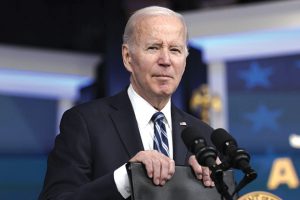Bloomberg
Joe Biden’s clean technology law has dragged the European Union into a subsidy fight that may trigger a transatlantic trade war, just as the allies are joining forces against Russia’s invasion of Ukraine.
The EU has always defended the global rules-based order, even as the US has grown increasingly hostile toward the constraints it adopted as a member of the World Trade Organization. But Biden’s $500 billion in new spending and tax breaks to boost domestic green industries over the next decade may prove to be the final straw.
The EU unveiled its Green Deal Industrial Plan this past week in an effort to accelerate the development of its clean technology sector through massive investment aid and tax credits. The European legislation is still being negotiated, but if it follows in the US footsteps it could make the WTO even less relevant.
With the US Inflation Reduction Act appearing to run afoul of international subsidy rules forbidding domestic content requirements, how the EU proceeds may leave the WTO, and the post-World War II system it represents, on the sidelines as the world’s economic superpowers embark on new era of confrontation with no holds barred.
“The big problem we have at the moment is that some of the instruments countries are using to fight climate change are contrary to the norms of international trade,†Arancha González Laya, former executive director of the International Trade Centre and former Spanish foreign affairs minister, said in an interview. “I am concerned that we are entering into a period where a new form of interdependence, which is climate change, will be tackled with purely nationalistic approaches.â€
China’s Rise
The most recent phase of globalization accelerated in the 1990s following the disintegration of the Soviet Union and the spread of US-led trade values across the world. China’s entry into the WTO in 2001 helped supercharge the global economy by 76% over the following 20 years and raised some 1 billion people out of poverty. But the shock of China’s meteoric rise brought pain to foreign workers — particularly in regions with labor-intensive manufacturing like electronics, apparel, tires, steel and aluminum.
Former President Donald Trump blamed the WTO for failing to curb China’s worst trade abuses and policymakers in Washington broadly accept that the organization is unfit for purpose. As the US became disaffected with the trading system it developed, it caused disharmony between Washington and Brussels.
 The Gulf Time Newspaper One of the finest business newspapers in the UAE brought to you by our professional writers and editors.
The Gulf Time Newspaper One of the finest business newspapers in the UAE brought to you by our professional writers and editors.
